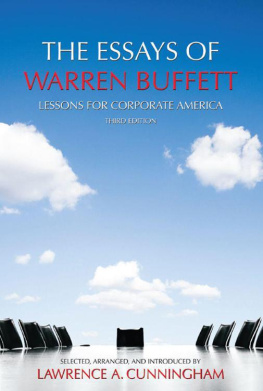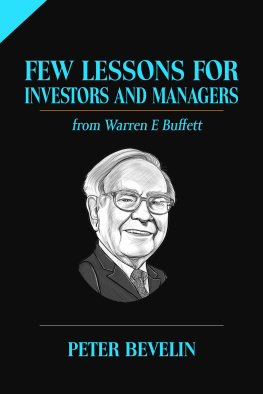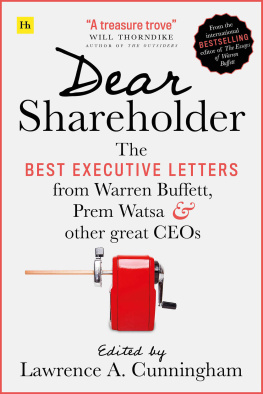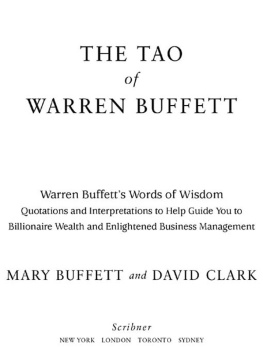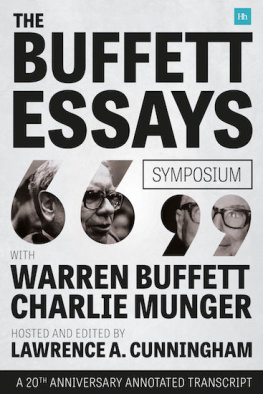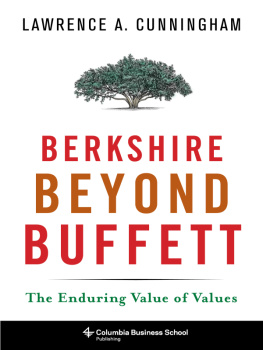T HE E SSAYS OF W ARREN B UFFETT :
L ESSONS FOR C ORPORATE A MERICA
T HE E SSAYS OF W ARREN B UFFETT :
L ESSONS FOR C ORPORATE A MERICA
E SSAYS BY
W ARREN E. B UFFETT
S ELECTED , A RRANGED, AND I NTRODUCED BY
L AWRENCE A. C UNNINGHAM
T HIRD E DITION
Library of Congress Cataloging-in-Publication Data
eISBN: 978-1-61163-447-1
Cunningham, Lawrence A., 1962
Buffett, Warren E., 1930
The Essays of Warren Buffett: Lessons for Corporate America / selected, arranged, and introduced by Lawrence A. Cunningham3d ed.
308 p. 26 cm.
Includes previously copyrighted material. Reprinted with permission. Includes bibliographical references and index.
1. CorporationsUnited StatesFinance. 2. Corporate governanceUnited States. 3. InvestmentsUnited States. 4. StocksUnited States. 5. Consolidation and merger of corporationsUnited States. 6. AccountingUnited States. I. Buffett, Warren E. II. Cunningham, Lawrence A. III. Title.
HG4061.B8372 2001
(OCoLC) 38497313
Originally published as part of the Cardozo Law Review s special issue on The Essays of Warren Buffett Symposium . Copyright Lawrence A. Cunningham, 1997, 2001, 2008, and 2013. Includes previously copyrighted materials, Warren E. Buffett, reprinted with permission. All rights reserved. Printed in the United States of America.
ISBN: 978-1-61163-409-9
Copies of this collection are available in larger quantities at special discounts to use for teaching, training, promotions, premiums or other purposes. For more information, please contact Carolina Academic Press, 700 Kent Street, Durham, NC 27701, http://www.cap-press.com.
The speech I love is a simple, natural speech ,
the same on paper as in the mouth;
a speech succulent and sinewy, brief and compressed ,
not so much dainty and well-combed as vehement and brusque.
Michel de Montaigne
The Essays of Montaigne (1580)
The sincerity and marrow of the man reaches to his sentences .
I know not anywhere a book that seems less written .
Cut these words and they would bleed; they are vascular and alive.
Ralph Waldo Emerson
Representative Man (1850)
(Referring to Montaigne and his Essays )
T ABLE OF C ONTENTS
P REFACE
The original edition of The Essays of Warren Buffett: Lessons for Corporate America was the centerpiece of a symposium held two decades ago at the Benjamin N. Cardozo School of Law under the auspices of its Samuel and Ronnie Heyman Center on Corporate Governance. This gathering brought hundreds of Cardozo students together for a two-day dissection of all the ideas in the collection, featuring a series of vibrant debates among some 30 distinguished professors, investors, managers, and other students, with Warren E. Buffett and Charles T. Munger participating throughout from their seats in the front row.
The Essays was the standard textbook for a specialized course I taught at Cardozo in proper business practices and is adopted by scores of professors at other law and business schools for classes such as investment, finance and accounting. Some investment firms have distributed copies to their professional employees and clients as part of training programs. I am grateful for the positive feedback from these students, teachers, and other users and delighted to know that the lessons are being taught and learned. Special thanks to Professor Tom Johansen (Ft. Hays State University, Kansas) and Professor Leo Chan (Delaware State College).
Continuing thanks also to Mr. Buffetts good friend and advisor, Robert Denham, whom I have had the pleasure of getting to know in the years following the symposium. Mr. Denham, a partner in the law firm Munger, Tolles & Olsen, introduced Mr. Buffett to Cardozo and me through another mutual friend, former Munger, Tolles colleague and now Cardozo professor Monroe Price, and I thank both of them for opening that door. Thanks also to Carol Loomis, a close friend of Mr. Buffetts and the person who annually edits each shareholder letter. For institutional support in countless ways, thanks as always to Sam and Ronnie Heyman.
As in previous editions of The Essays , this one retains the architecture and philosophy of the original edition but adds selections from Mr. Buffetts most recent annual shareholder letters. All the letters are woven together into a fabric that reads as a complete and coherent narrative of a sound business and investment philosophy. As an aid to all readers, and to enable readers of the previous editions to see what is new in this one, a disposition table at the end of the book shows the various places in this collection where selections from each years letter appear. Footnotes throughout indicate the year of the annual report from which essays are taken. To avoid interrupting the narrative flow in this collection, omissions of text within excerpts are not indicated by ellipses or other punctuation.
The new edition is called for not because anything has changed about the fundamentals of sound business and investment philosophy but because Mr. Buffetts articulation of that philosophy is always done in the context of contemporary events and business conditions. So periodic updating is warranted to maintain its currency.
In preparing the previous editions, I was aided by numerous people, to whom I expressed gratitude in those editions, and I want to thank them again. Among those, I especially thank Mr. Buffett. His generosity not only made the symposium possible but his participation enriched it manifold; his willingness to entrust the rearrangement and republication of his letters to me is a great honor. His partner, Charlie Munger, deserves repeated thanks too, for not only did he participate in the symposium from the front row he also graciously chaired, on a moments notice, one of the panels.
Lawrence A. Cunningham
New York City
February 2, 2013
I NTRODUCTION
Lawrence A. Cunningham
Experienced readers of Warren Buffetts letters to the shareholders of Berkshire Hathaway Inc. have gained an enormously valuable informal education. The letters distill in plain words all the basic principles of sound business practices. On selecting managers and investments, valuing businesses, and using financial information profitably, the writings are broad in scope, and long on wisdom. By arranging these writings as thematic essays, this collection presents a synthesis of the overall business and investment philosophy intended for dissemination to a wide general audience.
The central theme uniting Buffetts lucid essays is that the principles of fundamental business analysis, first formulated by his teachers Ben Graham and David Dodd, should guide investment practice. Linked to that theme are management principles that define the proper role of corporate managers as the stewards of invested capital, and the proper role of shareholders as the suppliers and owners of capital. Radiating from these main themes are practical and sensible lessons on the entire range of important business issues, from accounting to mergers to valuation.
Buffett has applied these traditional principles as chief executive officer of Berkshire Hathaway, a company with roots in a group of textile operations begun in the early 1800s. Buffett took the helm of Berkshire in 1964, when its book value per share was $19.46 and its intrinsic value per share far lower. Today, its book value per share is around $100,000 and its intrinsic value far higher. The growth rate in book value per share during that period is about 20% compounded annually.
Berkshire is now a holding company engaged in 80 distinct business lines. Berkshires most important business is insurance, carried on through various companies including its 100% owned subsidiary, GEICO Corporation, among the largest auto insurers in the United States, and General Re Corporation, one of the largest reinsurers in the world. In 2010, Berkshire acquired Burlington Northern Santa Fe Corporation, among the largest railroads in North America, and has long owned and operated large energy companies. Some Berkshire subsidiaries are massive: eight would be included in the Fortune 500 if they were stand-alone companies. Its other interests are so vast that, as Buffett writes: when you are looking at Berkshire, you are looking across corporate America. Examples: food, clothing, building materials, tools, equipment, newspapers, books, transportation services and financial products. Berkshire also owns large equity interests in major corporations, including American Express, Coca-Cola, International Business Machines (IBM), Procter & Gamble (through merger with longtime holdings in Gillette), The Washington Post, and Wells Fargo.
Next page
